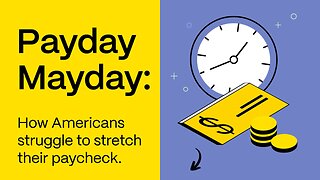Premium Only Content

Majority of parents concerned about risk of unknown hereditary conditions
Two in five American parents think they know everything there is to know about their biological family’s health history, a new survey suggests.
Despite less than half (38%) knowing all of their biological family’s health history, nine in 10 parents polled agreed knowing this is an important part of knowing their own health risks.
That’s according to a recent poll of 2,000 U.S. respondents from a nationally representative sample for age, gender, region and ethnicity, about 90% of whom self-identified as parents.
Over eight in 10 (82%) parents surveyed were concerned about the risk of unknown hereditary conditions because they don't know more about their family’s health history.
Conducted by OnePoll on behalf of 23andMe, the survey also suggests that American parents are as likely to have complete medical information for their father as their mother (67% and 64% respectively), but by the next generation, those numbers drop.
Parents surveyed were less likely to have records for their paternal grandparents (38%, grandfather and 19%, grandmother) than they are for maternal grandparents (49% grandfather, 44% grandmother).
For those who can’t connect with their biological relatives, or who are looking for further, more in-depth information about their health history, there are other options. Half of parents polled (51%) have researched historical and medical records to learn more about their family.
And 52% of parents polled have taken a DNA test for health information — something 81% said is important in helping fill gaps they have about their biological family’s health history.
“If you have the ability to discuss your family’s health history with an actual living family member, don’t squander that opportunity,” said Noura Abul-Husn, VP, Genomic Health at 23andMe. “It can be a difficult conversation, and maybe they won’t have complete information to share, but every little bit can help bring you closer — and healthier — together.
“As beneficial as those conversations can be, DNA tests can also fill in the gaps, providing information even your relatives might not be aware of.”
Of those who have taken a DNA test, 76% said they’ve adopted healthier behaviors as a result.
Common DNA-inspired habits — for parents who have made healthy changes after taking a DNA test — included eating healthier (70%), improving stress and mindfulness (67%), and getting more exercise (67%).
DNA test or not, 46% of parents rate their overall health as “very healthy,” but only 39% strongly agree they’re in control of their health.
Roughly three in four (78%) were confident that they have the information they need to be proactive about their future health.
“Genetic testing is an underutilized tool available for people to uncover important health info about their family and themselves,” added Abul-Husn. “Genetic testing can’t tell you the future, of course, but it can help you determine potential risk factors that you might not have known about, so you’re able to make better-informed choices for yourself and your family.”
AMONG PARENTS, WHO HAS THE MOST ACCESSIBLE HEALTH RECORDS?
Father (65%)
Mother (63%)
Mother’s father (48%)
Mother’s mother (43%)
Father’s father (38%)
Father’s mother (19%)
Survey methodology:
This random double-opt-in survey of 2,000 Americans — from a nationally representative sample for age, gender, region and ethnicity, about 90% of whom self-identified as parents — was commissioned by 23andMe between April 20 and April 21, 2023. It was conducted by market research company OnePoll, whose team members are members of the Market Research Society and have corporate membership to the American Association for Public Opinion Research (AAPOR) and the European Society for Opinion and Marketing Research (ESOMAR).
-
 0:52
0:52
SWNS
6 days agoHow much of your paycheck do you spend after receiving it?
58 -
 17:17
17:17
Lady Decade
1 day ago $4.63 earnedMortal Kombat Legacy Kollection is Causing Outrage
27.1K6 -
 35:51
35:51
Athlete & Artist Show
1 day ago $8.10 earnedIs Ryan Smith The Best Owner In The NHL?
39.4K4 -
 22:56
22:56
American Thought Leaders
2 days agoCharles Murray: I Thought Religion Was Irrelevant to Me. I Was Wrong.
34.8K19 -
 36:22
36:22
Brad Owen Poker
8 hours agoGIGANTIC $17,000+ Pot In BOBBY’S ROOM! TRAPPING Top Pro w/FULL HOUSE!! Big Win! Poker Vlog Ep 326
36.7K -
 3:53
3:53
NAG Daily
1 day agoRUMBLE RUNDOWN: DREAM HACK SPECIAL W/Greenman Reports
30.5K7 -
 1:28
1:28
Damon Imani
2 days agoThey Laughed at Trump’s Cognitive Test — Damon Made Them REGRET It!
38.3K28 -
 9:14
9:14
Freedom Frontline
1 day agoAdam Schiff PANICS As Eric Schmitt Exposes His Dirty Lies LIVE
25.4K60 -
 10:32
10:32
GBGunsRumble
1 day agoGBGuns Armory Ep 153 Adler Arms AD-9`
16.8K2 -
 35:53
35:53
Degenerate Plays
7 hours ago $0.74 earnedRuckus Randy And Repair Ronald (Socks On) - Call of Duty: Modern Warfare 2 (2009) : Part 7
11K1